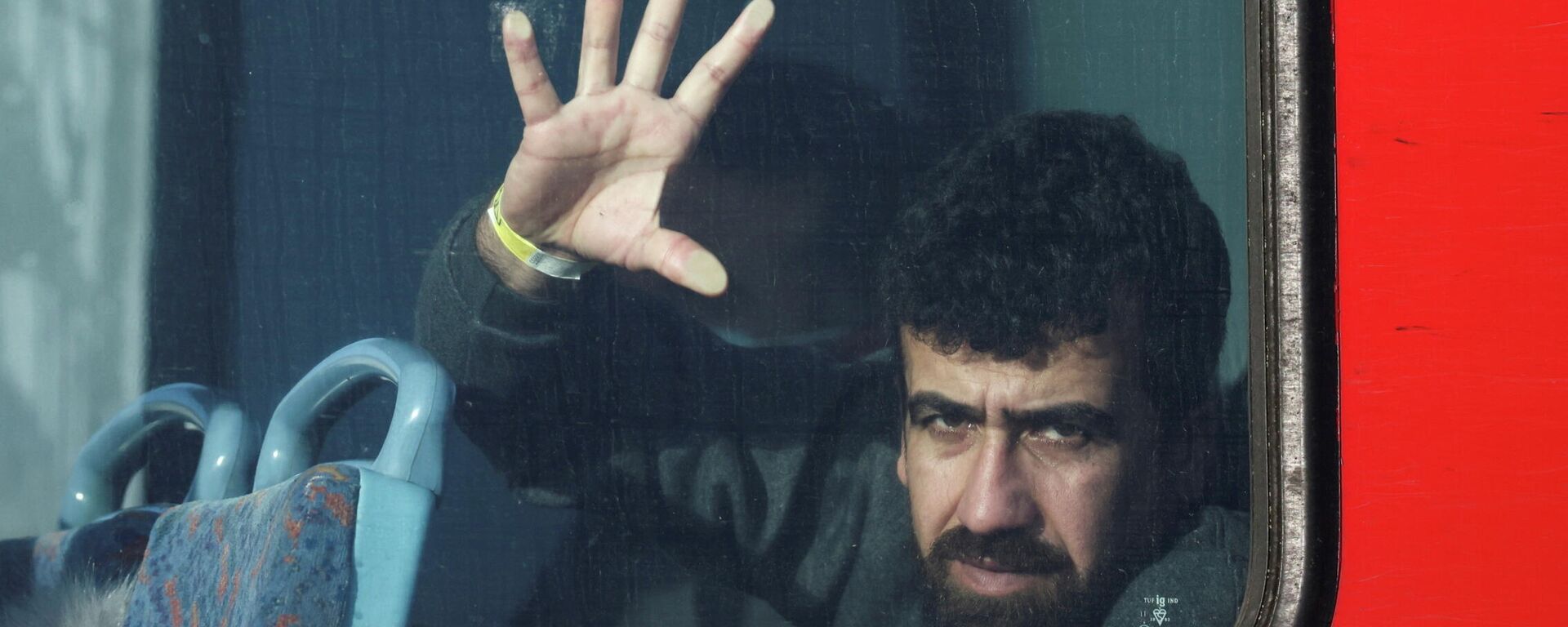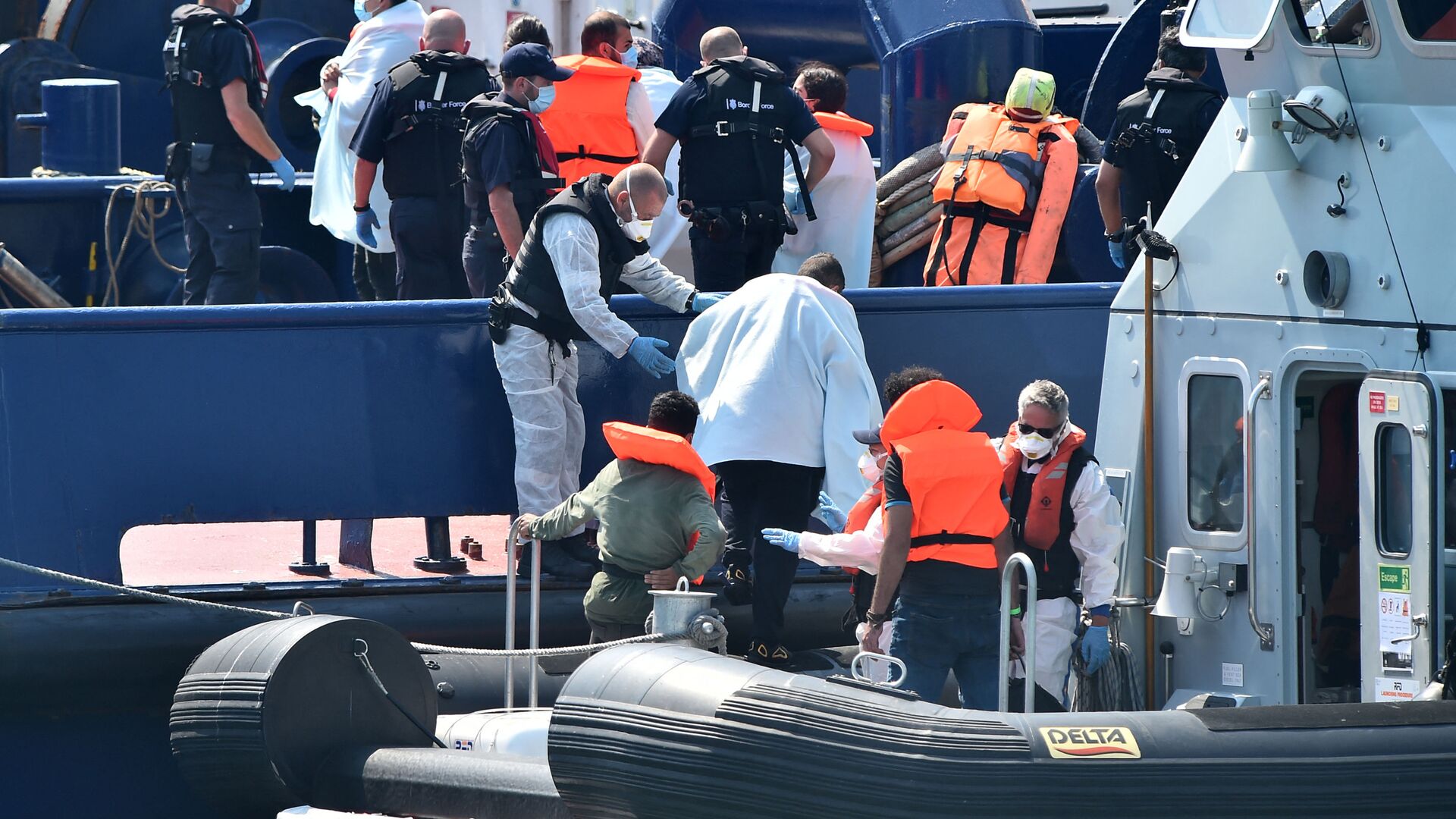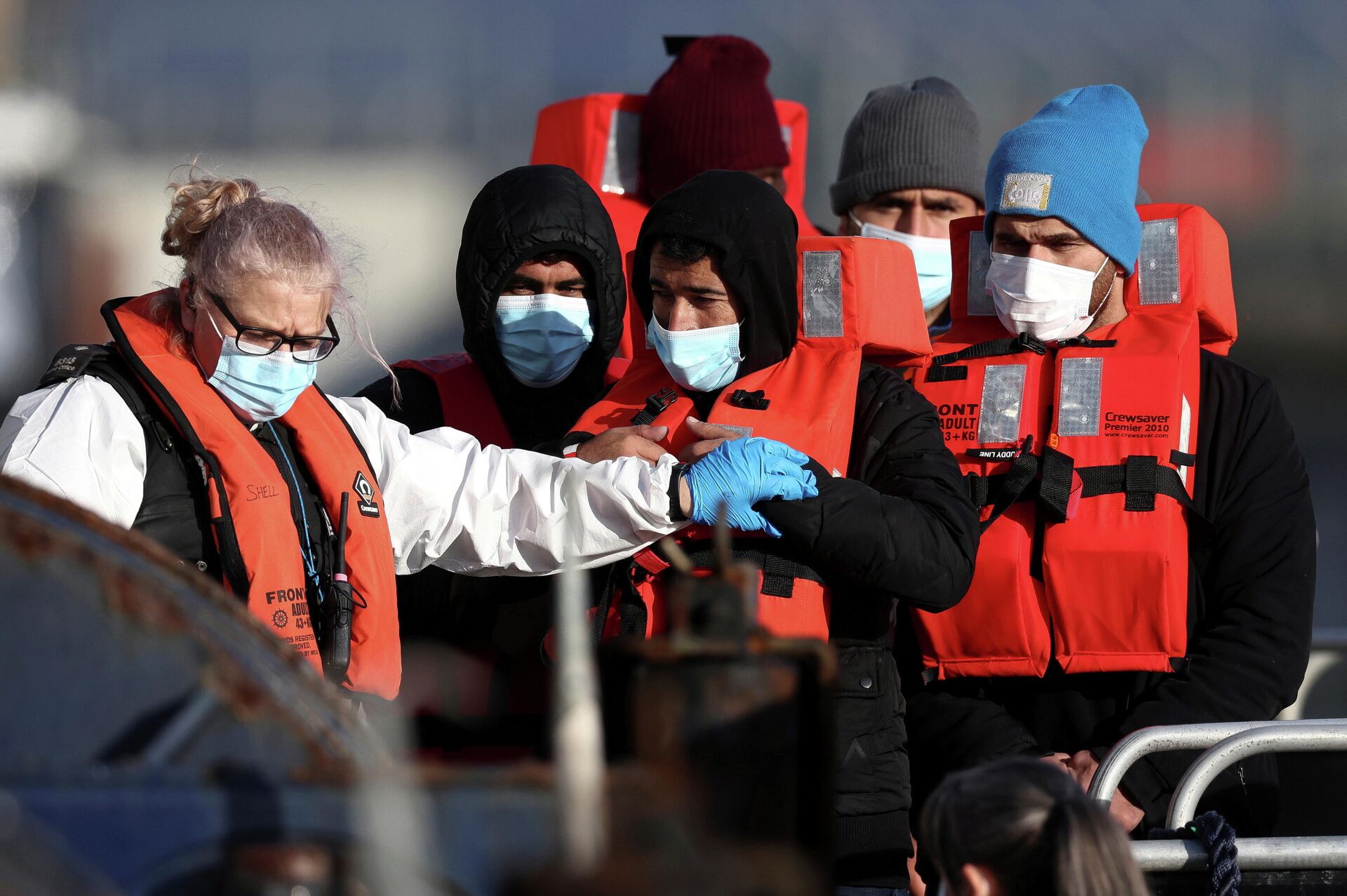https://sputnikglobe.com/20211119/how-does-british-mass-migration-crisis-affect-uk-france-relations-and-counter-terror-strategy-1090858245.html
How Does British 'Mass Migration Crisis' Affect UK-France Relations and Counter-Terror Strategy?
How Does British 'Mass Migration Crisis' Affect UK-France Relations and Counter-Terror Strategy?
Sputnik International
UK Home Secretary Priti Patel has for the first time described the situation with migrants in her country as a "mass migration crisis", lashing out at the... 19.11.2021, Sputnik International
2021-11-19T16:09+0000
2021-11-19T16:09+0000
2023-05-28T15:16+0000
opinion
migrants
terrorism
migrant crisis
united kingdom (uk)
https://cdn1.img.sputnikglobe.com/img/07e5/08/08/1083552965_0:268:3073:1996_1920x0_80_0_0_07e4293d746c42af61f883476d7c9a13.jpg
The United Kingdom has faced an increased number of people seeking to migrate into the country - as per Home Office data, more than 24,000 people have already arrived in the UK this year, which is a stark contrast to the 2020 figures of some 8,400 migrants.The growing migration flows have not left the British government unbothered. While Home Secretary Priti Patel called the situation a "mass migration crisis" when speaking in Washington, DC during her negotiations with her US counterpart Alexandro Mayorkas, she underlined that the United Kingdom is not the only country affected by it - on Twitter, she stressed the importance of international cooperation "on combatting terrorism and the global migration crisis".Besides, Patel signalled that due to the openness of the EU borders envisaged by the Schengen Agreement, the "migration crisis" affects the bloc as well, and particularly, as France, which shares a maritime border with Britain.In light of one of the recent squabbles between London and Paris over how the countries agreed (or did not agree) on a deal to prevent "100 percent" of migrant Channel crossings from France, concerns are raised that they may fuel the already tense post-Brexit relations between the two nations.When it comes to migration-related issues, some experts believe that the harsh reality shows that political concerns take over the humanitarian sentiments. Dr David Lowe, a senior research fellow at Leeds Beckett University Law School and head of a consultancy business in terrorism and security, admits that such stance is "unfortunate" and points at how the migrant crisis becomes just a drop in the bucket of the problems existing in the relations of London and Paris.David Otto, the counter-terrorism director of Global Risk International (GRI), weighed in on the issue, focusing on how cooperation to tackle the migrant crisis can be overshadowed by a lack of trust in bilateral relations.He went on to admit that France and the UK "are at daggers drawn", and "the level of suspicion is too high to reach any meaningful agreement on the existing migration crisis".The tense interplay between London and Paris is not the only issue that contributes to the complexity of the migrant crisis being faced by the United Kingdom.Fears of Terror Threat and How They May Be Connected With Migrant CrisisIn the middle of November, the UK Home Office announced that the national terrorism threat level in the country had been increased from "substantial" to "severe". The announcement came in the wake of a gruesome bomb incident in Liverpool when a taxi cab exploded outside Liverpool Women’s Hospital on Remembrance Sunday. The incident was branded a terrorist attack and is suspected to have been masterminded by Iraq-born Emad Al Swealmeen, who was twice refused asylum in the United Kingdom but remained in the country.According to him, one of the biggest problems is that once a person is refused asylum, the Home Office does not remove them, but recommends signing up for the voluntary return programme to their home state, as it has no support and no work permission in the UK. However, in the event of it not being done, the Home Office does not know where they are. This is why, Lowe underlines, Al Swealmeen was not deported. But the way things work, he suggests, is "likely to change" following the Liverpool attack.The UK home secretary is even more confident that changes are needed in the way illegal migrants are being treated in the UK, as she asserted that the country's "dysfunctional" system had been "exploited" in the Liverpool attack.There are many more industries profiting from the struggle of people seeking a better life in the United Kingdom. Being an island, the country has its vast coastline exposed when it comes to human smuggling and trafficking. Despite the Border Agency and Home Office warning of the potential dangers behind attempts to cross the English Channel, the number of such crossings still remains an acute issue.And, while Otto expects it to be "challenging" for both countries, he also underlines the importance of addressing the causes for the migration.Is There a Solution?There are certain strategies in the UK to buffer the migrant flow into the country - for example, the Channel and Prevent programmes, but both experts admit they are not "designed to be perfect"."Channel and Prevent programs have practical limitations and these programs are not designed to be perfect - realistically, it cannot be 100% effective in preventing and stopping every individual in the UK from extremism and violent extremism behaviour", explains Otto.As put by the UK government, Channel/PMAP "is a programme which focuses on providing support at an early stage to people who are identified as being vulnerable to being drawn into terrorism". And while, according to David Lowe, a multi-agency approach to safeguard such persons can sometimes be successful in "bringing individuals back from an extremist cause to live a more normal life in society", more action may be needed to tackle the migration crisis. In particular, the experts say the revision of how illegal migrants are being dealt with has to be done, since accommodation and other efforts to integrate them remain a burden on UK taxpayers."This engagement is just a short term reactive response to a process that requires a long term and sustainable solution", says Otto, referring to the Channel and Prevent programmes. "It is a burden on taxpayers at a critical period of the economy, made worse by the impact of Covid-19 and Brexit. But the UK expresses its humanity through such endeavours even though the long term solution is to provide support for stability in the origin countries of vulnerable migrants. Treatment of the impact is insufficient".
https://sputnikglobe.com/20211119/priti-patel-blames-schengen-agreement-for-mass-migration-crisis-in-uk-1090851435.html
united kingdom (uk)
Sputnik International
feedback@sputniknews.com
+74956456601
MIA „Rosiya Segodnya“
2021
News
en_EN
Sputnik International
feedback@sputniknews.com
+74956456601
MIA „Rosiya Segodnya“
Sputnik International
feedback@sputniknews.com
+74956456601
MIA „Rosiya Segodnya“
opinion, migrants, terrorism, migrant crisis, united kingdom (uk)
opinion, migrants, terrorism, migrant crisis, united kingdom (uk)
How Does British 'Mass Migration Crisis' Affect UK-France Relations and Counter-Terror Strategy?
16:09 GMT 19.11.2021 (Updated: 15:16 GMT 28.05.2023) UK Home Secretary Priti Patel has for the first time described the situation with migrants in her country as a "mass migration crisis", lashing out at the Schengen Agreement and the European Union's "open border" policy as one of the key contributing factors.
The United Kingdom has faced an increased number of people seeking to migrate into the country - as per Home Office data, more than 24,000 people have already arrived in the UK this year, which is a stark contrast to the 2020 figures of some 8,400 migrants.
The growing migration flows have not left
the British government unbothered. While Home Secretary Priti Patel called the situation a "mass migration crisis" when speaking in Washington, DC during her negotiations with her US counterpart Alexandro Mayorkas, she underlined that the United Kingdom is not the only country affected by it - on Twitter, she stressed the importance of international cooperation "on combatting terrorism and the global migration crisis".
Besides, Patel signalled that due to the openness of the EU borders envisaged by the Schengen Agreement, the "migration crisis" affects the bloc as well, and particularly, as France, which shares a maritime border with Britain.
In light of one of the recent squabbles between London and Paris over how the countries agreed (or did not agree) on a deal to prevent "100 percent" of migrant Channel crossings from France, concerns are raised that they may fuel the already tense post-Brexit relations between the two nations.
When it comes to migration-related issues, some experts believe that the harsh reality shows that political concerns take over the humanitarian sentiments. Dr David Lowe, a senior research fellow at Leeds Beckett University Law School and head of a consultancy business in terrorism and security, admits that such stance is "unfortunate" and points at how the migrant crisis becomes just a drop in the bucket of the problems existing in the relations of London and Paris.
"Relations between the UK and France have not been that cordial post-Brexit from fishing rights through to the issue of those in camps in northern France, that was even an issue when the UK was an EU Member State", Lowe says. "I understand the UK’s position that for both economic and political asylum seekers in France, they have in effect arrived at a state that can provide them security".
David Otto, the counter-terrorism director of Global Risk International (GRI), weighed in on the issue, focusing on how cooperation to tackle the migrant crisis can be overshadowed by a lack of trust in bilateral relations.
"The UK sees France as the source of its illegal migration issues - on the other hand, France considers the UK as an unreliable ally", Otto explains. "One would think that both neighbouring countries would agree that 100 percent coordination is required to stop illegal migration but the current bad blood between UK and France made worse by Brexit and AUKUS means there is no real trust in effective collaboration as far as migration issues are concerned".
He went on to admit that France and the UK "are at daggers drawn", and "the level of suspicion is too high to reach any meaningful agreement on the existing migration crisis".
The tense interplay between London and Paris is not the only issue that contributes to the complexity of the migrant crisis being faced by the United Kingdom.
Fears of Terror Threat and How They May Be Connected With Migrant Crisis
In the middle of November, the UK Home Office announced that the national terrorism threat level in the country had been increased from "substantial" to "severe". The announcement came in the wake of a gruesome bomb incident in Liverpool when a taxi cab exploded outside Liverpool Women’s Hospital on Remembrance Sunday.
The incident was branded a terrorist attack and is suspected to have been masterminded by Iraq-born Emad Al Swealmeen, who was twice refused asylum in the United Kingdom but remained in the country.
"The issue with al Swealmeen remaining in Liverpool, UK is one that has resulted in the UK’s Home Secretary, Priti Patel calling the system dysfunctional", Lowe says. "The fact al Swealmeen remained in the UK since his asylum application was refused could be the trigger for the Home Office to introduce new policies, even have the Home secretary introduce legislation to cover this problem".
According to him, one of the biggest problems is that once a person is refused asylum, the Home Office does not remove them, but recommends signing up for the voluntary return programme to their home state, as it has no support and no work permission in the UK. However, in the event of it not being done, the Home Office does not know where they are.
This is why, Lowe underlines, Al Swealmeen was not deported. But the way things work, he suggests, is "likely to change" following the Liverpool attack.
"The UK will now have to investigate and look back and say - you know what, if we are refusing people asylum, then the next option that we should take is to deport them. Because if you do not deport them you make them vulnerable and expose them to [all kind of threats]", says Otto, echoing the sentiment.
The UK home secretary is even more confident that changes are needed in the way illegal migrants are being treated in the UK, as she asserted that the country's "dysfunctional" system had been "exploited" in the Liverpool attack.
"These people have come to our country and abused British values, abused the values of the fabric of our country and our society. And as a result of that, there's a whole industry that thinks it's right to defend these individuals that cause the most appalling crimes against British citizens, devastating their lives, blighting communities - and that is completely wrong", Patel insisted.

19 November 2021, 08:37 GMT
There are many more industries profiting from the struggle of people seeking a better life in the United Kingdom. Being an island, the country has its vast coastline exposed when it comes to human smuggling and trafficking. Despite the Border Agency and Home Office warning of the potential dangers behind attempts to cross the English Channel, the number of such crossings still remains an acute issue.
"You cannot really stop people from being smuggled", explains David Otto. "I think the only way that you can do that is if you have some control of your borders, but you can share a border with France in which most of these asylum-seeking to enter the country. They come in the waterways. So I think it's going to be very challenging and you need to stop these illegal migrants from coming in, especially with the relationship between the UK and France".
And, while Otto expects it to be "challenging" for both countries, he also underlines the importance of addressing the causes for the migration.
"The illegal immigration wheel never stops from turning", he says. "Home Office boss cannot afford to focus only on migrants that have successfully entered UK illegally - equal and proactive attention must address the roots causes and help to prevent more illegal entries into the UK".
There are certain strategies in the UK to buffer the migrant flow into the country - for example, the Channel and Prevent programmes, but both experts admit they are not "designed to be perfect".
"Channel and Prevent programs have practical limitations and these programs are not designed to be perfect - realistically, it cannot be 100% effective in preventing and stopping every individual in the UK from extremism and violent extremism behaviour", explains Otto.
As put by the UK government, Channel/PMAP "is a programme which focuses on providing support at an early stage to people who are identified as being vulnerable to being drawn into terrorism". And while, according to David Lowe, a multi-agency approach to safeguard such persons can sometimes be successful in "bringing individuals back from an extremist cause to live a more normal life in society", more action may be needed to tackle the migration crisis.
"What is needed is an overhaul of legislation and policy with relevant agencies being allowed to deal expeditiously with those who are not granted asylum", Lowe suggests.
In particular, the experts say the revision of how illegal migrants are being dealt with has to be done, since accommodation and other efforts to integrate them remain a burden on UK taxpayers.
"This engagement is just a short term reactive response to a process that requires a long term and sustainable solution", says Otto, referring to the Channel and Prevent programmes. "It is a burden on taxpayers at a critical period of the economy, made worse by the impact of Covid-19 and Brexit. But the UK expresses its humanity through such endeavours even though the long term solution is to provide support for stability in the origin countries of vulnerable migrants. Treatment of the impact is insufficient".






